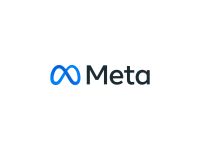Meta: Difference between revisions
No edit summary |
No edit summary |
||
| Line 4: | Line 4: | ||
| logo_caption= Meta logo | | logo_caption= Meta logo | ||
| type = Public | | type = Public | ||
| industry = Technology | | industry = Technology | ||
| founded = February 4, 2004 | | founded = February 4, 2004 | ||
| founder = Mark Zuckerberg | | founder = Mark Zuckerberg | ||
| location = Menlo Park, California, U.S. | | location = Menlo Park, California, U.S. | ||
| hq = Menlo Park, California, U.S. | | hq = Menlo Park, California, U.S. | ||
| area = Worldwide | | area = Worldwide | ||
| services = Social networking services | | services = Social networking services | ||
| products = Facebook | | products = Facebook | ||
| phone = +1 650-543-4800 | | phone = +1 650-543-4800 | ||
| employees = 86,482 (2023) | | employees = 86,482 (2023) | ||
Revision as of 00:32, 11 August 2025
Meta Platforms, Inc. (commonly known as Meta) is an American multinational technology conglomerate specializing in social media, virtual reality, and augmented reality. Headquartered in Menlo Park, California, Meta is one of the world’s leading companies in the digital and social technology space.
| Meta Platforms, Inc. | |
|---|---|
 |
|
| Meta logo | |
| Type | Public |
| Industry | Technology |
| Founded | February 4, 2004 |
| Founder | Mark Zuckerberg |
| Headquarters | Menlo Park, California, U.S. |
| Area Served | Worldwide |
| Location (s) | Menlo Park, California, U.S. |
| Products | |
| Services | Social networking services |
| Employees | 86,482 (2023) |
| Phone | +1 650-543-4800 |
| Website | https://about.meta.com |
| https://www.facebook.com/meta | |
| https://www.linkedin.com/company/meta/ | |
| https://www.instagram.com/meta/ | |
History
Meta was originally founded as Facebook, Inc. in February 2004 by Mark Zuckerberg and his college roommates. It began as a social networking website for Harvard students but quickly expanded globally. Facebook went public in 2012 and later acquired several popular platforms including Instagram in 2012 and WhatsApp in 2014.
In October 2021, Facebook, Inc. rebranded as Meta Platforms, Inc., signaling a strategic shift toward building the metaverse, a virtual-reality-based digital environment.
Products and Services
- Facebook: The original social networking platform connecting billions worldwide.
- Instagram: Photo and video sharing platform acquired in 2012.
- WhatsApp: Messaging application acquired in 2014.
- Messenger: Facebook’s standalone messaging app.
- Oculus VR: Virtual reality hardware and software platform.
- Horizon Worlds: Meta’s social virtual reality platform.
- Workplace: Enterprise collaboration tool.
- Portal: Video communication devices.
- Meta Quest Store: Marketplace for VR apps and games.
Metaverse Vision
Meta aims to build the metaverse, a collective virtual shared space merging physical and digital realities. This includes:
- Virtual reality (VR) environments accessed via VR headsets.
- Augmented reality (AR) overlays blending digital content with the real world.
- Social interaction and collaboration within immersive virtual spaces.
- Digital economies supporting virtual goods and services.
Corporate Structure
Meta operates several subsidiaries, including Facebook, Instagram, WhatsApp, and Reality Labs (focused on VR/AR). The company has offices worldwide and employs tens of thousands of people.
Controversies and Criticism
Meta has faced controversies involving:
- User privacy and data handling, including the Cambridge Analytica scandal.
- Content moderation challenges such as misinformation and hate speech.
- Regulatory scrutiny over market dominance and acquisitions.
- Reports on workplace culture and management issues.
Financial Performance
Meta is publicly traded on NASDAQ under the ticker symbol META. Its revenue is primarily driven by digital advertising. The company invests heavily in research and development, especially in VR, AR, and artificial intelligence.
Research and Development
Meta focuses on:
- Artificial intelligence for content recommendation and moderation.
- Virtual reality (VR) and augmented reality (AR) hardware and software.
- Blockchain and digital payments to explore new digital ownership models.
Future Plans
Meta plans to expand its metaverse ecosystem by:
- Developing new VR and AR hardware and software.
- Enhancing social VR experiences.
- Building virtual workplaces and entertainment spaces.
- Fostering creator economies within virtual environments.

